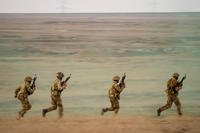The Senate has confirmed the four-star general appointment of Lt. Gen. John M. Murray, who will become the first commander of the new Army Futures Command.
The Army nominated Murray, the service's modernization guru, to lead the new command in mid-July, after the senior leaders announced that Austin, Texas had been selected to become the home of the command responsible for leading the Army's ambitious modernization strategy.
Bruce Jette, the Army's assistant secretary of the Army for Acquisitions, Logistics and Technology [ASSALT], said Tuesday, a day after Murray's confirmation, that he looked forward to working with Murray as the new head of Futures Command during a speech at the National Defense Industrial Association's Science & Technology Symposium and Showcase.
"If you don't know him, he's a really, really bright guy," Jette said, adding that Murray, as AFC commander, will take over supervision of the Army's laboratory system, a responsibility that used to fall under ASSALT. "I get along really well with him, and we have had discussions about looking at the best ways to enable the lab system to move into the future."
The move to confirm Murray comes as some call into question the Army's entire plan for Futures Command. Language in the recently passed 2019 National Defense Authorization Act requires the Army to submit a detailed study to Congress early next year describing the structure and leadership of the planned command.
And a new amendment to the appropriations bill that will fund the defense budget would put funding for Futures Command on hold until two Government Accountability Office studies examining the command's cost-effectiveness are completed, Stars and Stripes reported. The Army has yet to provide a clear cost estimate for the command's establishment next year.
Murray, who has been serving as the deputy chief of staff for Army G-8, has been the service's voice of modernization at congressional hearings and other public events.
As an infantry officer, Murray held leadership positions ranging from commanding 3rd Brigade, 1st Cavalry Division, during Operation Iraqi Freedom to serving as commanding general of Joint Task Force-3 in Afghanistan.
Murray has also served as director of Force Management at the Pentagon; assistant deputy director for Joint Training, J-7, on the Joint Staff; and director of the Joint Center for Operational Analysis for U.S. Joint Forces Command.
After an exhaustive search of U.S. cities, the Army announced July 13 that Austin has the right mix of industrial innovation and academia to support the Army's vision for building a future force. AFC is scheduled to be at full operational capability by next summer.
The Army announced its plan to stand up Army Futures Command last October. The service unveiled its six new modernization priorities: long-range precision fires; next-generation combat vehicle; future vertical lift; a mobile network; air and missile defense; and soldier lethality.
-- Matthew Cox can be reached at matthew.cox@military.com.










